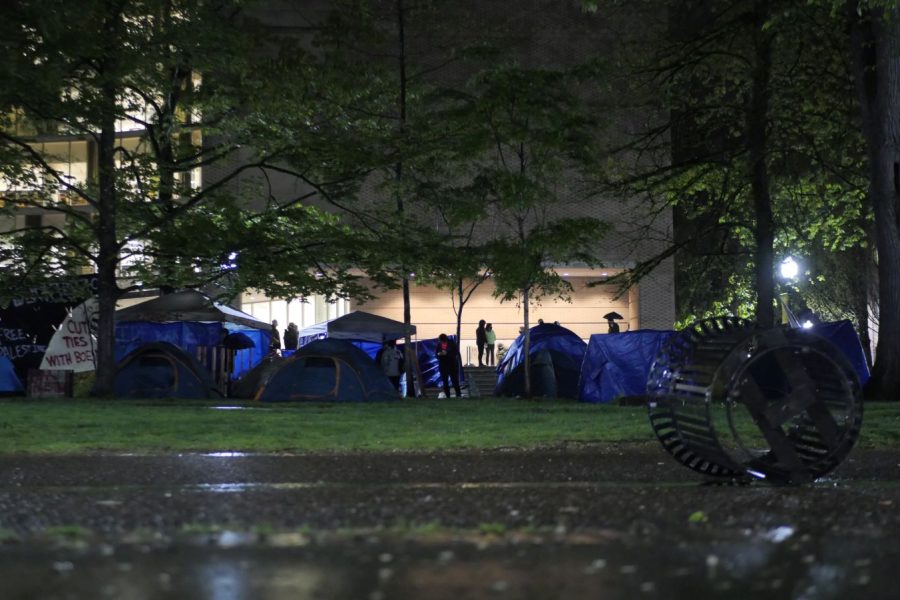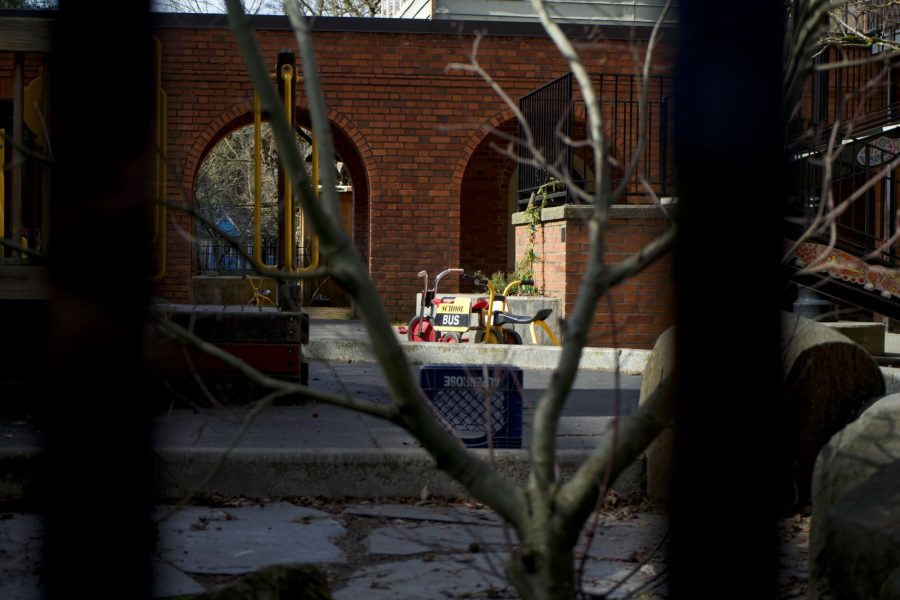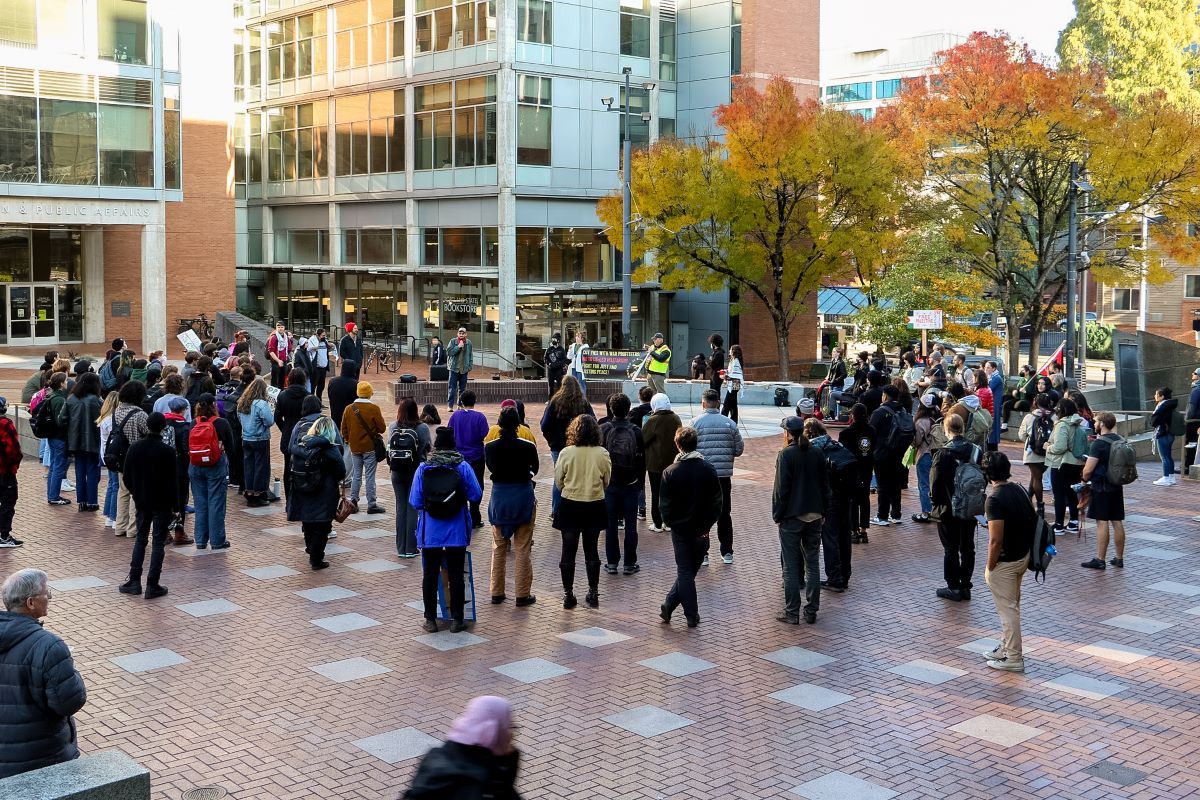On May 13, the Associated Students of Portland State University (ASPSU) passed a resolution calling to discontinue Portland State’s affiliation with the weapons manufacturing company Boeing. This resolution was authored by the current ASPSU President Yousif Ibrahim, Vice President Ulfet Tayba, current ASPSU Senator Michael Jones and the Students United for Palestinian Equal Rights (SUPER). Similar resolutions calling for the divestment from companies that profit off war have passed at other universities, including the University of Wisconsin-Madison, the University of Chicago, the University of Oregon and Harvard University.
The Student Advocacy Committee, Operations Board and Student Fee Committee also contributed, as well as several other student and faculty organizations: MECHA PSU, DisarmPSU, the Muslim Student Association, the Arab Student Association, the Association of African Students, Las Mujeres, the Somali Student Association, the Arab-Persian Student Organization, the Black Student Union (BSU), Cuba Solidarity, Faculty & Staff for Justice in Palestine, the Cambodian Student Association, Dream PSU and PSU Kaibigan.
The resolution urges the PSU Board of Trustees to “pass a resolution to terminate current partnerships and relationships with Boeing, and other companies complicit in genocide and prevent future partnerships and investment into the aforementioned company.”
“This company’s operations have been linked to significant ethical and humanitarian concerns, particularly in the realms of war, violence, and human rights abuses,” stated the resolution. “Portland State University must reevaluate and ultimately sever its ties with Boeing to align its practices with its core values of sustainability, equity, diversity, and inclusion.”
This is the third resolution passed by ASPSU which calls for PSU’s divestment from Boeing. The previous resolutions were passed in 2016 and 2021, though the administration ultimately dismissed them.
The current resolution urged the PSU Board of Trustees to “pass a resolution to terminate current partnerships and relationships with Boeing, and other companies complicit in genocide and prevent future partnerships and investment into the aforementioned company.”
Boeing is the fifth largest military company in the world, and the resolution explained how Boeing designs, manufactures and sells military weapons such as combat aircraft, bombs, missiles and other weapons technology. Boeing has been a crucial supplier to the Israeli military, with their ties going as far back as 1948 when the state of Israel was founded, causing the mass displacement and dispossession of Palestinians that continues to this day.
According to Amnesty International, U.S.-made bombs produced by Boeing were found directly responsible for the deaths of 43 Palestinian civilians in Oct. 2023. Amnesty International said this action could qualify as a war crime.
According to PSU President Ann Cudd, Boeing donated $150,000 to name a classroom in the Karl Miller Center and provides $28,000 a year for scholarships and emergency funds for students. Cudd also said that PSU has no direct investment in Boeing, but she mentioned that an executive from Boeing currently sits on the advisory board for the School of Business, and hundreds of alums from both the School of Business and the Maseeh College of Engineering work for Boeing.
This resolution draws upon PSU’s purported values of sustainability, diversity, equity and inclusion. According to the resolution, partnerships with companies like Boeing go against these values as such companies participate in destroying natural resources and harming diverse populations.
“We must continue to foster a safe, inclusive, and sustainable campus environment that embraces the principles of equity, diversity and inclusion that Portland State holds at the center of its mission,” stated the resolution. “We must engage in ethical practices for students, faculty, and staff. This resolution in no way promotes hateful rhetoric or ideologies against our Israeli and Jewish communities at PSU, but rather calls for separation from a company that contributes to multiple human rights violations, profits from war crimes, and manufactures machines that are being used to claim innocent lives.”
Many PSU students and faculty testified about the university’s relationship with Boeing. Stephanie Wahab—a professor in the School of Social Work—said she supports the resolution.
“Severing our university’s relationship with companies that benefit from apartheid, ethnic cleansing, and genocide is a practice of hope as it makes clear a different relational reality is possible for the university,” Wahab’s testimony stated. “Severing these ties also enacts PSU’s value that we ‘accept challenges and embrace change.’”
Theodore A. Khoury—a first-generation Palestinian-American professor of management and strategy at PSU—also wrote in support of the resolution and described it as a proud moment for him as a professor.
“With over 35,000 civilians now dead, nearly 11K missing, abducted or buried, over 78K seriously injured and over 1.7 Million displaced from their destroyed homes, Israel’s project was and (as I write this, still) is being accomplished through various Boeing technologies,” Khoury stated in his testimony. “Whether it be the F-15 fighter jets, the Chinook and Apache attack helicopters, the unguided small diameter bombs (SDBs), or joint direct attack munition (JDAM) kits that convert these bombs to precision-guided munitions, Boeing is front and center in enabling genocide and ASPSU is simply recognizing the sheer conflict between the values PSU promotes versus what it actually models.”
PSU student, member of SUPER and first-generation Palestinian-American Natalie explained in her testimony how Cudd’s decision to pause donations from Boeing until the situation can be properly debated is not enough.
“Pausing to then have a debate about ethics is a slap in the face,” Natalie stated. “The very fact that you are even posing a debate about ethics when my home is destroyed, when there are students that attend this university that have lost family members, when Arab/Muslim students at this university have been assaulted on this campus, when we as [Indigenous] people have lost everything, I was raised by a refugee that cannot return to his homeland, they took our homes.”
The BSU explained how the oppression of Black Americans is synonymous with the ongoing genocide in Palestine, and how this resolution would help bolster PSU’s values of diversity, equity and inclusion.
“The response by this university has been subpar and has communicated to its students, Palestinian, Black, or any other marginalized group, that it prioritizes profit over them,” the BSU testimony stated. “This resolution would staunchly change that narrative and set the tone that PSU truly values diversity, equity, and inclusion. We, the Black Student Union, will always advocate for equal human rights and just treatment for everyone. We encourage our institution to do the same and cut ties with Boeing.”
In addition to urging the university to cut ties with Boeing, the resolution also urges for PSU to strategically replace the benefits derived from its partnerships with Boeing with alternatives that better align with the university’s ethical standards and values in a manner that minimizes disruption to students who benefit from this partnership.
The resolution also encourages the university to fund and support causes and projects which align with PSU’s values of anti-racism and sustainability until it cuts ties with Boeing.
“This includes but is not limited to 1) New curriculums teaching methods to dissect Islamophobia, Anti-Semitism, Anti-Palestinian and Anti-Arab rhetoric,” the resolution stated. “2) Workshops catering towards safety for students on campus. 3) The continuation of the dialogue task force and its promotion. A student-majority committee should be formed and contribute to this process. We demand that our institutional funds are fully transparent and easily accessible and that students and the Portland State University community are given a voice in how our funds are allocated.”






